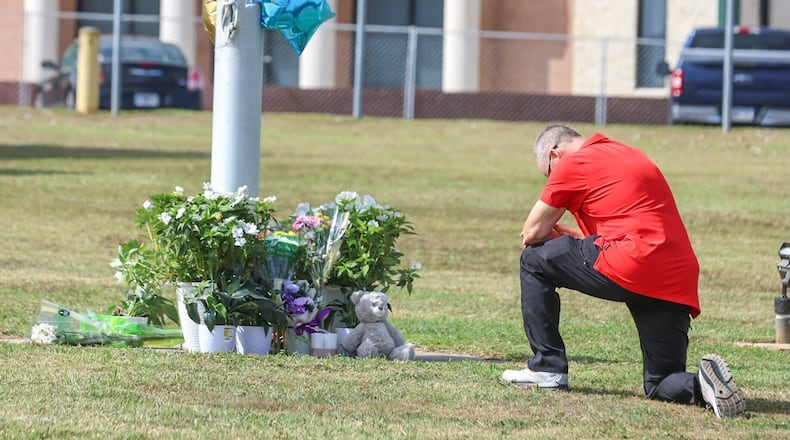When I saw the breaking news of the Apalachee High School mass shooting in September, my heart stopped. I sat in my office and prayed to God for the safety of the children and teachers. The shock I felt reminded me of the day during my time as solicitor general when a young gunman with mental health issues walked into the Ronald McNair Discovery Academy with an automatic weapon and enough ammunition to kill hundreds of students and staff.
Thank God a veteran school employee, Antoinette Tuff, calmly talked the would-be attacker down before he could hurt anyone. This happened in my own backyard — my two young daughters were locked down in their elementary school a few blocks away, and the district attorney’s office I now lead prosecuted the case. So, as I sat at my desk that day in September, contemplating the 385th mass shooting of 2024, I wondered how we can still be here reacting to this terrible violence instead of doing everything we can to prevent it.
Credit: Handout
Credit: Handout
As the leader of the second largest district attorney’s office in the state, I am no stranger to the issues at hand: gun violence, gun rights, mental health treatment and due process. My duty to protect my community never leaves my mind. I will continue to aggressively prosecute violent offenders, but what about prevention? In 2019, Dayton, Ohio, police confronted an active shooter 20 seconds after he started his attack. Ten seconds after that, the shooter was dead. Nine people were killed and 27 were injured over the course of 30 seconds.
Fast, effective response is not enough. Law enforcement urgently needs a tool to stop these tragedies before they happen. I believe the right tool is what is known as an extreme-risk protection order or “red flag law.”
In the months leading up to the tragedy at Apalachee, the FBI identified the accused shooter as a potential threat, and the Jackson County Sheriff’s Office interviewed him and his father. But neither had committed a crime, so law enforcement was unable to intervene further. The accused gunman’s father later bought his son an assault rifle for Christmas and has been charged in connection with the attack.
Before a shooter killed 17 people at Parkland High School in Florida in 2018, a relative informed the FBI that she feared that the attacker “was going to slip into a school and start shooting the place up.” Local police officers were repeatedly called to the gunman’s house because of threats and disturbing behavior, and two school guidance counselors and a sheriff’s deputy recommended that he be admitted for psychiatric care. All of those concerned people were powerless.
A 2018 FBI study of mass shooters’ pre-attack behavior found that, on average, each perpetrator exhibited four to five observable concerning behaviors. A similar study by the Secret Service in 2019 found that every single one of the 41 mass shooters studied exhibited concerning behaviors prior to their attacks.
Twenty-one states — including Florida, Virginia, New Mexico and Nevada — have enacted red flag laws. These laws, which vary around the country and can be tailored to a state’s specific needs, generally allow family, school employees and law enforcement to ask a local court to determine if a person is a threat to himself or others. After the due process of that hearing, the court may order that all firearms be temporarily removed from the person’s home and that the person be prohibited from possessing guns until a mental health and/or substance abuse evaluation has been completed. Contrary to the concerns of opponents of red flag laws, none of this happens automatically. The law simply empowers concerned people to ask a court to investigate. It is up to the court to receive evidence and decide whether to issue an order. That order is temporary, and the subject of the order has a right to appeal.
As we look back in anguish at the tragedy at Apalachee (and so many others), we have heard from family, community members, and law enforcement who saw warning signs but were helpless to do anything. A red flag law is a common sense, narrowly tailored tool that could have saved lives.
Georgia lawmakers will convene at the State Capitol on Jan. 13 to begin this year’s legislative session. House Speaker Jon Burns has endorsed an expansion of mental health care access and wants to offer incentives for safe storage of guns as well as toughen penalties against people who make terroristic threats against a school. He also wants to examine a statewide mandate for mental health and behavior monitoring of students to encourage better coordination between administrators and authorities.
These are good steps in the right direction but are not sufficient to empower law enforcement to identify and intervene with shooters before they act. Passing a red flag law should also be a top legislative priority.
We must give community members and law enforcement the power to ask for help in averting foreseeable tragedy. Let’s take steps to temporarily remove guns from the hands of people who have demonstrated to those who know them best that they are a danger. We cannot wait for the next breaking news, the next community ripped apart, the next child’s casket wrapped in a Superman cape.
No single measure will end the epidemic of gun violence in this country, but with a red flag law, Christian Angulo, Mason Schermerhorn, Richard Aspinwall and Cristine Irimie might well be starting the spring semester at Appalachee High School.
Now is the time for action.
Sherry Boston is the DeKalb County district attorney.
About the Author
Keep Reading
The Latest
Featured




